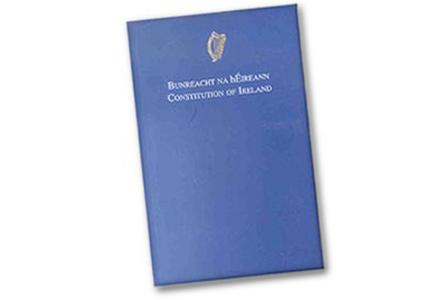Bunreacht na hÉireann and the people's right to rule

We, the people of Ireland, remembering "the heroic and unremitting struggle to regain the rightful independence of our Nation" enacted for ourselves Bunreacht na hÉireann, the basic law upon which our State exists.
We live in what we ourselves have constituted as a "sovereign, independent, democratic state." We have stipulated that "All powers of government...derive...from the people" and that it is our right to "decide all questions of national policy".
We have stated that it is our "inalienable, indefeasible, and sovereign right to choose our own form of Government" and "to determine" our relations with other nations.
In Bunreacht na hÉireann we have set out our system of local and national government to give expression to these declared wishes of the people - for democracy, and for the creation of State policy according to our determination.
Yet, it is common to hear government ministers tell us that our sovereignty is lost - without anyone ever asking us! It is common for ministers to decide policy for the State without any reference to us, the citizens, and for such policy to be imposed on us. Our government is subject to the rules set down in our Constitution but, despite that, it acts so as to rule over us, to dictate rather than give effect to our mandate on all matters of State policy.
Our decision-making power is usurped by those we have entrusted with representing us.
The democracy which we constituted for ourselves has been usurped by vested interests, both native and foreign. Laws have been enacted which are contrary to our Constitution and which facilitate the continued domination of our State by these vested interests and the system of political parties which represents them.
But, the sovereign rights of the people are "inalienable", meaning that they can never be taken away, denied, or transferred. It is no more possible for us to give away our sovereignty than it is for anyone to agree to slavery - any such enslaving contracts or treaties are null and void.
The people never decided that our democracy should be run by what are in effect private members’ clubs of vested interests; in fact there is no mention in Bunreacht na hÉireann of political parties at all. Article 16.2.1 states that:
"Dáil Éireann shall be composed of members who represent constituencies determined by law."
It does not state that TD's should represent parties, or even that a TD might represent themselves as 'independent' - it states that they "represent constituencies". Currently, no elected TD honours this Constitutional duty - they comply with party 'whips', they make deals, they conspire to enact their own policies. None of them seek or carry a mandate from the citizens they are charged to represent.
The acceptance of 'opposition' status, or a party 'whip' means that, effectively, the electorate of the constituencies that returned these TDs is disenfranchised - their representatives are reduced to having no say in decision-making. In practice, a handful of individuals in government wield all power in the State - dictating even to the Dáil. This practice is supported by Dáil standing-orders, electoral acts, sham standards in public office, bureaucracy, lies, corruption, inter-party collaboration and the connivance of vested interests in the media, accounting and legal professions, trade unions, academia, banking and finance 'experts', etc.
When one considers the many millions in State finance diverted into the party system alongside all of this it is clear that citizens are having their right to have their constituency representatives act on their mandate denied. They tell us we have elections to decide these matters, but this amounts to no more than a few minutes every few years to vote on candidates - mainly selected by private members’ clubs called political parties - to whom we hand over our mandate. Even these elections are compromised in what they promise, because the political parties are financed directly and receive preferential treatment throughout - even on the ballot paper. Only a tiny minority of citizens are members of any political party, possibly 1%, yet the party system is allowed to dominate.
The same abuse of mandate happens at local government level, which is supposed to provide "a forum for the democratic representation of local communities".
So, our democracy has been usurped by vested interests and the political parties that are tied so closely to them.
We must empower ourselves
The main provisions needed for us, as citizens, to empower ourselves are contained in Bunreacht na hÉireann, but we need to implement it. We need to organise so that we can select and elect our own constituency representatives at every level of government, ignoring the political party system and their private selection process. We need to continually mandate these representatives and check up on the implementation of our decisions. We need to recall these representatives when they fail in their duty to represent the constituency.
In this way there will be no 'government and opposition' charades in the Dáil, but rather just constituency representatives; there will be no party 'whip'; and, crucially, there will be democratic control and rule by the people. In these conditions we can set about finding the solution to all of the problems we face, including much-needed reforms in every aspect of public administration and including the creation of an economic policy that truly reflects the needs and interests of the people.
For this to happen individuals must make the decision to step forward; to take responsibility for spreading this consciousness in their own communities and collaborating with others of like mind. We must build a movement of citizens without any precondition as to policy or ideology, uniting simply on the demand for securing our democracy - that it is the right of the citizens to rule, our right to determine the policy of our State. {jathumbnailoff}
Diarmaid Ó Cadhla is spokesperson for The People’s Convention (CPPC).
